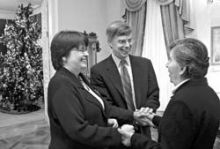Ambassador Taylor’s wife Deborah, who is a religion scholar, also took part in the interview. The talk was not about strategic, political, or international matters linked to Ukraine (these are not very festive topics): it pivoted on such a pressing issue as the celebration of New Year’s Day and major Christian feasts. Nevertheless, there was no avoiding politics.
The Day presented the Taylor couple with the books that our newspaper has published in the past few years. They were most interested in the book Day and Eternity of James Mace about the American national who did so much for Ukraine. William Taylor noted that the US Embassy has requested the government of Ukraine to rename a Kyiv street in honor of James Mace. @AU political consolidation and thus failed to form a single mighty state, something like ancient imperial Rome, although they were skilful warriors and strategists. Do you think that Ukrainians also have a similar historical draw
“Mr. Ambassador, how would you assess Ukraine’s prospects for 2007? Do you think 2006 showed a total defeat of the Orange forces and that we failed to take advantage of the ‘green light’ that the West gave us? Many realists in Ukraine think that there was simply nobody to go through the door that was opened for us.”
“In my opinion, Ukraine has all sorts of possibilities and considerable potential to develop in 2007 the achievements of the past two years. Proof of this is, first of all, two very important events, i.e., the last Ukrainian elections (the runoff presidential election in 2004 and the parliamentary election last March) which were free and fair, and internationally approved and acclaimed. It was on the basis of those elections that the West gave a ‘green light’ to Ukraine. Challenges certainly remain; political challenges for Ukraine. The president and the prime minister need to find a way to work together for the good of Ukraine. I believe that the international community — and definitely the Americans — we believe that Ukraine will be stronger if the president and the prime minister find a way to work together. We hope that 2007 can be a good year, we hope it will.”
“According to the distinguished Western philosopher Bertrand Russell, the ancient Greeks, who were very gifted people famous for their art and philosophy, were incapable of back?”
“I think Kyiv is as beautiful as many Greek cities. And I think the Ukrainian people are every bit as able to consolidate democracy as any country in ancient or current history. Democracy in ancient Greece was messy, and democracy in Ukraine is messy; democracy in the United States has been messy, even in recent years. So, again, I have confidence in the Ukrainian people as I do in the Americans.”
“Mrs. Taylor is a religion scholar by profession and occupation. Are you interested in the history of Ukrainian Orthodoxy? Would you please tell our readers about the institutions that research and monitor religion in the US and about social problems that crop up in your country on religious grounds? Can there be any comparison with the religious situation in Ukraine? Or perhaps the point is just in the historical traditions of Byzantine churches? Another question: it is common knowledge that the US Senate supports Ecumenical Patriarch Bartholomew I. Should he promote recognition of the independent Ukrainian Orthodox Church more actively?”
Mrs. Taylor: “I think this is definitely a separate topic. I only arrived in Ukraine in September, and I have to confess that at this point I still don’t know much about Orthodoxy except that there are different groups. So far, I’ve been spending my time settling in the house and settling in the American community.”
“Maybe later?”
Mrs. T.: “Absolutely later. And my own work actually focuses on very early Christianity. Once you get to the 2nd or 3rd century...I don’t know much more than any other educated person. I am primarily interested in the Jewish nature of early Christianity.”
“May I ask you the following in this connection? Church historians are well aware of the impact of the Judaic Old Testament (especially the Torah and the prophets) on Christianity. But has there been at least some modest impact of Christianity on Judaism?”
Mrs. T.: “I think that there are Christians who may think differently, but I think that with the destruction of the Temple in 70 A.D. the Jewish people had massive problems continuing their own community and Christianity did not have a major impact.
“I am therefore trying to get a clearer view of the divisions within the Orthodox Church and the division between Orthodoxy and the Greek Catholics. My own experience as a Christian in the United States and my scholarly work on the early church don’t incline me to believe that there has ever been a case that Christianity has been a happy and undivided family. So I would be surprised if the problems that Orthodoxy has were much worse than the ones we have had throughout history in trying to understand the common way for our faiths.
“In fact, my image of the church is sort of captured by the Church of the Holy Sepulcher in Jerusalem. A year ago we were in Jerusalem, and I was very anxious to go to this church. I’d heard from many Americans that it was so different from what they were used to that they felt unsettled. It has to be remembered that many churches in the United States in many ways do not look very different from this room. They don’t have statues, they don’t have pictures, they are white, and they look like a place where you have just come to have a meeting. This applies to Protestant churches and, much less, to Catholic ones.
“But the Church of the Holy Sepulcher is almost the exact opposite in its variety, its lack of clean organization. I thought I had visited a community of saints because here were people from everywhere who dressed differently, who worshipped in different ways, and this has to be what heaven would be like.
“After we all leave here, we will have to reconcile our different visions, but I liked the Church of the Holy Sepulcher. It seems emblematic to me because it captivates you like no other church can, it shows the variety of Christianity, and it captures the problems of Christianity in the six different groups that have official hold of the church and do not get along very well because of many disputes.”
“Are you going to hear old Ukrainian Christmas and Epiphany carols in Ukrainian churches or on the streets? Some people say they are one of the most remarkable Ukrainian contributions to world culture. One more question: did you visit Kyiv’s theaters or the Philharmonic during the Christmas vacations?”
Mrs. T.: “I will gladly mention the Christmas carols because my Ukrainian teacher gave me a book with the music and a CD. So I am really looking forward to learning some of these Christmas carols. I don’t know what I am going to do for Christmas. My husband’s going to be in the United States for a while, but he’ll be back by Christmas Day. But I am hoping that this next year I will have an opportunity to visit many different churches, to worship in many different churches.
“We plan to go to many cultural performances here. In fact, we are going to one tonight. There’s a Strauss concert at the Opera House. Last week we saw the opera Taras Bulba and about three weeks ago we saw Natalka-Poltavka. I did like it, I like the folk music. You have a genius for creating a simple song that everybody can sing. That is just incredible.
“And we have also heard what we think was the first performance of the Italian opera Barber of Seville in Ukrainian. It was wonderful. I must say I tend to be nervous when operas get translated, particularly from a beautiful language like Italian. Certainly, when one is translated into English, it’s a step down in its beauty. In general, an opera in English works quite well, but an Italian opera in English is not superb. Ukrainian itself is such a musical language that everything worked so well.
“We are just learning Ukrainian, and people often ask what Ukrainian is like and what its relationship is to Russian. I always say that it is the Italian of the Slavic languages!”
“How did you celebrate Christmas in Kyiv, far away from your homeland?”
Mrs. T.: “This year we tried to celebrate Christmas here the way we celebrate it at home, which means decorating our house and inviting our friends and their families. And the trimmings of this tree: when I was still in elementary school, my mother, who doesn’t do anything halfway, bought me a new Christmas tree and some other things. And every year we were buying a few more things, and by the time we were married we had a very nice tree, and we have enjoyed decorating it every year, we enjoy people’s reactions to it, and we continue to look for things, especially things that remind us of people and places where we’ve been. So this tree has many memories for us.”
“How is life in this Podil villa, in the shade of Saint Andrew the Apostle’s Hill? Do you have a chance to get to know Podil and its historic places?”
Mrs. T.: “For me it is a great honor to be here. You just mentioned St. Andrew’s Church. One of the most wonderful things for me is that on the very top floor of this building there is a room that I’ve taken over as my office, and it has a skylight that looks out directly onto the church, and I spend quite a lot of time there. I think I will manage to get a lot of work done, looking at a church like this.”
(At my request, the Taylors kindly agreed to show us this top floor with a skylight that looks out on Rastrelli’s church and which, for some reason, conjures up a vision of Paris.)
“I am sure that if you make more skylights on the top floor of your Kyiv house toward the other cardinal points, you will be able to see fine urban landscapes, for example, the Church of the Holy Virgin’s Intercession designed by the architect Hryhorovych-Barsky or the Dnipro River with Trukhaniv Island almost beneath the windows.”
Mrs. T.: “We know the church of the Holy Virgin’s Intercession very well: we listen to its choir practice on Saturdays. It is a superb choir indeed.”
“I am certain that The Day’s readers will be glad to become more closely acquainted with the US ambassador to Ukraine and his wife. Thank you very much.”
DOSSIER
William B. TAYLOR, Jr., graduated from the US Military Academy at West Point and saw service in Vietnam and other hot spots. In 1997 he graduated from Harvard University with an M.A. in public politics. He worked at the US Department of Energy, served in Brussels as deputy defense advisor at the US Mission to NATO, was the coordinator of USG assistance to the former Soviet Union and Eastern Europe, and has visited Ukraine numerous times. The ambassador has an excellent familiarity with Ukraine’s political establishment. Many Ukrainian and American experts agree that in all his activities William Taylor will adhere to the principle that he formulated in 2002: “Ukraine is important to the region. It’s important to the world that this country be stable and independent. We want to support its independence and sovereignty.”









